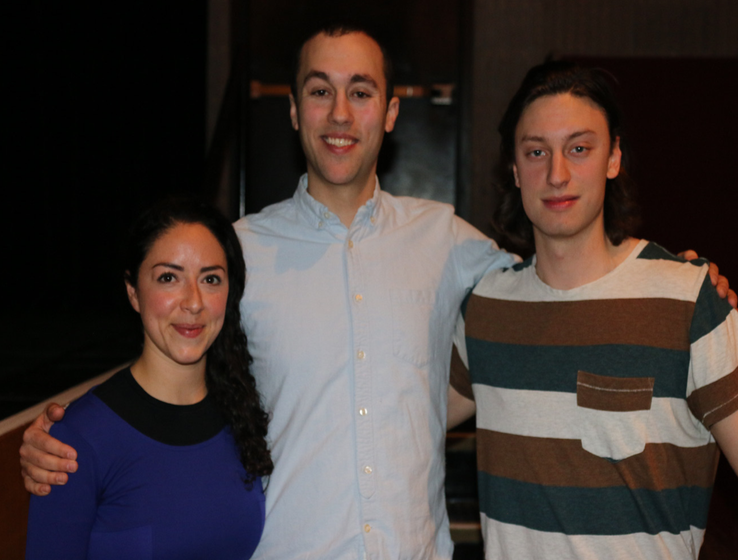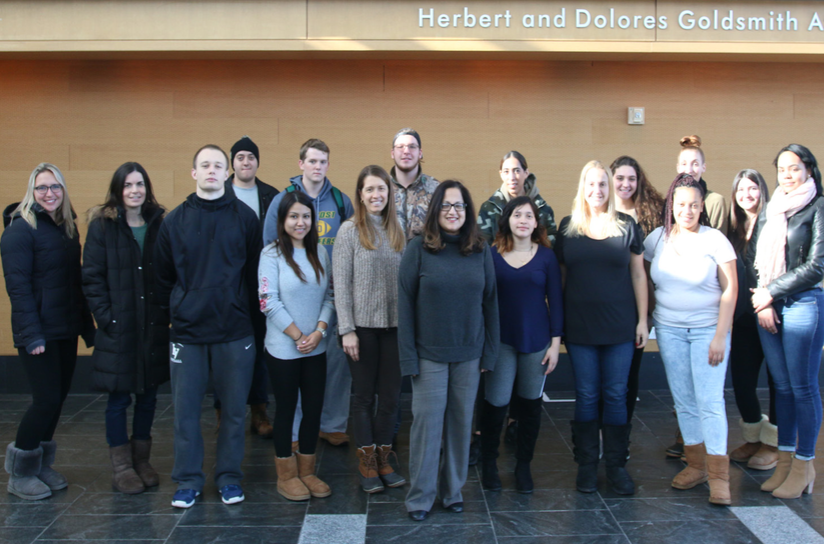By Jacqueline Escobar
Staff Writer
Shaireen Rasheed, professor of philosophical foundations and multiculturalism in the School of Education, Information and Technology enriched her class by allowing them to attend “Jabber”, a play performed at the Tilles Center by Mariana Tayler, Ian Geldart, and David Sklar. The play taught students the importance of not judging someone from a different culture.

Cast members of Jabber
“Jabber,” written by Marcus Youssef, tells the story of a young Muslim-American girl named Fatima, who has been perceived as a bad individual in her new educational environment. Jorah, a guy who has a reputation at school, places stereotypical labels on her by making statements such as “What’s the scarf on your head,” criticizing her hijab. Fatima, however, takes a stand and tells Jorah that she isn’t who he thinks she is. Throughout the play, Jorah learns to trust Fatima and vice versa, despite their two different worlds. Fatima has her own beliefs from her country, but Jorah slowly develops a way to understand it.
“Stephanie Turner, the LIU Arts education director for outreach at Tilles Center is a visionary in that she is very committed to shows that will raise the consciousness of students by exposing them to contemporary discourses and struggles in society.” Rasheed said.
With the passion for emphasizing the importance of culture, Rasheed believes that her students in her EDI and EDU courses must be exposed to the current issues. She talks about the importance of theater in her teaching pedagogy.
“Since my classes deal with the social and philosophical constructions of identity as it intersects with race, gender, sexuality, and ability, I thought this particular theatrical performance would be a good example of how such identities get played out in real life; Also, in the current climate, it is important for students to be aware of how some identities are silenced in which educators can be more inclusive in our settings.” Rasheed said.
“The play elucidates the dangers of stereotyping. In the play, “a girl who wears a hijab is bullied because of that and in understanding her journey helps us better understand other students similar to what she has gone through.” Rasheed said. “There were other aspects of the play that are important such as domestic violence, consent, cyber bullying that are brought up in relation to the boy she befriends, all the topics that as educators, we need to be aware of.” she added.
Rasheed believes that the writer of the play, Marcus Youssef, helps students understand how cultures are integrated, especially in the Muslim community.

“Schools, as the writer of “”Jabber”” says, are places where unlike almost anywhere, people of all histories and backgrounds are thrown together, and where young people of all kinds must learn about what they believe in, and how far they are willing to go to defend those beliefs.” Rasheed said.
Dr. Arnold Dodge, chair and associate professor of the department of educational leadership and administration [in the College of Education, Information, and Technology believes the play is a must see for students today.
“I was profoundly moved by “Jabber”,- he said. “The playwright Marcus Youse , tackled what may be the most important subject of our times: the imperative of social justice for all people, particularly for Muslims worldwide.”
“The message is particularly important to widely share with youth who may be disenchanted with our leaders; The actors portrayed their characters with dignity, the relationship that develops between Fatima and her high school friend transcends the meanness that occurs when we demonize the “other,” Dodge said.
Dodge believes that classrooms should incorporate lessons like these that will expose students to other cultures and ways of thinking. “The classroom curriculum must include a potent civics component if we are to defeat the scourge of authoritarianism.” he said.
Dodge recommends that other students see “Jabber” in order to widen their perception. “I recommend that everyone sees the production, especially secondary school and college students who are forming their perspectives of the wider world.” he said.
Georgina Perlata, an American-Dominican, who is a sophomore, majoring in early childhood education with a concentration in Spanish, found “Jabber” to be eye opening.
“Jabber was an eye-opening performance, it loudly spread the message about how Muslims are a targeted group of discrimination; the way Fatima experiences the discrimination in school by being called a terrorist and the way she dresses mirrors what happens in schools today.” she said.
Peralta believes that schools should continue to implement messages like this to students today.
“It is important for educators and students to see plays like this to be inspired to learn about different cultures and be more understanding; once everyone becomes aware of the history behind different cultures, we can get closer to unite as one.” she said.
[Editors Note: The author of this article is in Shaireen Rasheed’s class.]




Great article on the play “Jabber” by Jacqueline Escobar who I am proud to say is my student and a recipient of a prestigious journalism award. Thank you to my favorite newspaper, The Pioneer for excellent reporting!